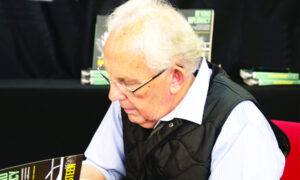[ad_1]
PRESIDENT Hage Geingob has criticised wealthy countries for causing the climate crisis and being untruthful about the fight against climate change.
On the sidelines of the ongoing 27th Conference of the Parties to the United Nations (UN) Framework Convention on Climate Change (COP27) in Egypt, Geingob was quoted by the BBC saying wealthier nations have turned climate conferences into “talking shops”.
COP27 is the 27th annual UN climate change conference which started on 6 November and will run until 18 November in Sharm el Sheikh.
According to the BBC, Geingob described the world’s largest polluters as criminals, and Third-World nations as their victims.
In defending Geingob’s statement, presidential spokesperson Alfredo Hengari said yesterday Geingob merely meant to say pollution is a criminal activity due to its impact on people and the planet.
“There is an important nuance that we must all grasp beyond the crass and crude interpretation you want to graft into the usage of the word (criminal), which is essentially to refer to high levels of pollution that can be equated to criminal activity in light of the dangers this poses to people and the planet,” Hengari said.
Malawi’s president, Lazarus Chakwera, this week also criticised wealthier nations by saying: “ . . . we believe that the clear difference in the culpability and capacity between developed nations must be reflected in the level of responsibility they bear for climate mitigation, adaptation and financing.”
Earlier this year, the Natural Resources Defence Council reported that wealthy countries, particularly the United States (US) and Western European nations, have emitted the lion’s share of greenhouse gases which has led to the climate crisis.
In fact, only 23 developed countries are responsible for half of all historical carbon dioxide emissions, yet developing nations are hit the hardest by the effects of this, and are the least prepared to respond.
This is why rich nations made a promise at the 2009 UN climate summit, or COP15, in Copenhagen, Denmark.
Together, they agreed to mobilise US$100 billion per year, officially beginning in 2020, to help developing countries reduce their emissions and adapt to the impacts of climate change.
GRANTS AND LOANS
In his prepared statement delivered at COP27 on Tuesday, Geingob told First-World countries to open their pockets by supporting and funding developing countries with climate change-related projects.
“Namibia encourages developed countries to support developing countries by capitalising the Green Climate Fund,” Geingob said.
He said Namibia joins the rest of the Developing World and broader community of nations in appealing for sustained efforts towards meeting the global target of global warming not exceeding 1,5 degrees Celsius.
The Namibian delegation this week received concessionary loans and grants worth N$10,6 billion at COP27 for the development of the country’s green and blue economy.
These include a N$767 million government grant from Invest International, an N$89,7 million government grant from the European Investment Bank, and a N$179 million grant for Hyphen Hydrogen Energy.
Hyphen also received a concessionary loan worth N$448 million during its feasibility study, while French major independent power producer Hydrogene de France (HDF) received a loan worth N$179 million for its utility scale solar hydrogen project.
The government also received a concessional loan worth N$8,9 billion from the European Investment Bank.
According to presidential financial adviser and hydrogen commissioner James Mnyupe, the terms of this agreement are still being negotiated.
SCEPTICISM
Meanwhile, the N$10,6 billion in concessional loans and grants Namibia received were met with scepticism by experts.
“It is mind-boggling that you borrow from the Europeans to supply them with gas and pay them to get energy sources from you. This reminds me of Trump’s wall: ‘I will build the wall, and Mexico will pay for it’,” local economist Omu Kakujaha-Matundu said this week.
He said loans should not be approved without parliamentary approval, adding that foreign loans in particular have serious economic and political ramifications.
“This madness of loans being concluded without the blessing of parliament is just unacceptable. Parliament is the supreme representative of the Namibian people. Not the executive,” Kakujaha-Matundu said.
He said in a country where projects are overshooting initial estimates, Geingob should assure taxpayers that this green hydrogen project won’t be inflated once it takes off.
He urged the Presidency to be transparent on what proportion of these loans and grants would be equity-financed, and which would be debt-financed.
Speaking on COP27, Landless People’s Movement spokesperson, Eneas Emvula, said the climate-change conference has become a playground for European countries to suppress African countries and have them commit to unsustainable deals.
“African leaders should stop allowing themselves to be put on a leash by these so-called developed nations. It’s a continued insult to our dignity and pride as Africans,” Emvula said.
He said the Presidency should start practising good governance instead of accumulating loans for projects that, in many instances, end up being mirages and bleed the economy dry as a consequence through high foreign debt.
“The fact that we fail to secure loans based on true commercial conditions in the market leaves a serious bad taste and an indication that we are considered delinquent and not worthy of dealing with on business principled terms, but rather fitting to be fed as second-class borrowers,” Emvula said.
Popular Democratic Movement leader McHenry Venaani welcomed the loans and grants, but cautioned against innate corruption.
“We welcome the development, but caution on the corrupt deals downstream that are seeing certain people enriching themselves. I call on president Geingob to curb that corruption,” Venaani said.
– Additional source BBC
[ad_2]
Source link




